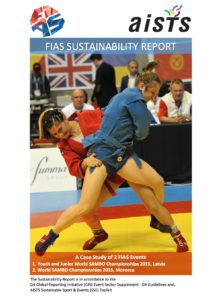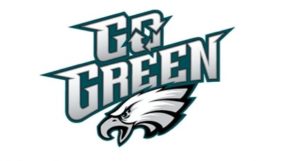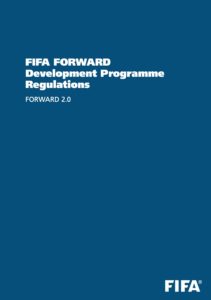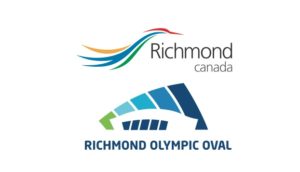
This module is part of a 12 clips guide created by SportAccord, AISTS, PI, and IOC, to help us understand sustainability as a whole, and look at what it means. Topics include ethical issues, cost and finance issues, possible partnerships, as well as the 7 steps to successful data gathering. (Video 12/12)
















Kit manif is a toolkit dedicated to facilitate the organization of sport and cultural events. KITmanif supports each organizer throughout the different phases of the event (planning, development and dismantling) with advice, practical tools and proposals from local service providers. Each section of Kitmanif aims to guarantee the sustainability of the events by considering it, not as an additional element to take into account, but as an integral part, a mode of reflection, in order to minimize the environmental impacts of the events while integrating social objectives and ensuring financial balance.









FIAS Sustainability report 2015
The FIAS sustainability report 2015 is created inorder to introduce sustainable practices in FIAS events.






Philadelphia Eagles 2019 Sustainability Report
What started with a blue recycling bin under each employee’s desk in 2003 has grown into a company-wide sustainability program that works year-round to reduce the team’s environmental footprint. With the help of partners and fans, the Philadelphia Eagles have been able to develop a multi-year curriculum and action plan that incorporates green energy production, recycling, composting, energy efficiency and reforestation, among other ventures.







A guide to making claims in relation to the Sustainable Golf Development Voluntary Sustainability Standard
This document is intended to guide project teams that have used the Sustainable Golf Development Voluntary Sustainability Standard (VSS) on the kinds of claims they can make about their project. By following this guide, a project team can confidentially and accurately communicate the achievements of their work.


















FIFA Forward launched a new era of global football development. FIFA is further strengthening its investment in development to build a stronger foundation for the growth of football, aiming at allowing many more young girls and boys to experience “Living Football”.















Global events, such as the Olympic Games, can be a significant source of greenhouse gas (GHG) emissions. Construction, operations and spectator travel are just some of the ways that large events produce GHG emissions. However, by employing low-carbon technologies and behavioral practices to mitigate these emissions, events can become innovative catalysts for sustainable development and leave a positive and lasting legacy on the host region, city or state.
The Dow Chemical Company (“Dow”), the official Carbon Partner of Sochi 2014 and Rio 2016, has developed the Climate Solutions Framework (herein “the Framework”) with the hopes of encouraging voluntary mitigation programs across the world.



Dow Climate Solutions Framework 2.0 – A Greenhouse Gas Mitigation Framework for Events
Details
Anthropogenic greenhouse gas emissions have been at the forefront of international policy discussion for several decades.
The overwhelming majority of climate scientists agree that human activities, especially the burning of fossil fuels (e.g., coal, oil, and gas), are responsible for most of the climate changes currently being observed.3,4 While international policy makers continue to work for emissions limitation and reduction commitments that stabilize GHG concentrations, it is clear that businesses need to be responsible for the economic, environmental and social dimensions of their pursuits, and for developing solutions to help make the planet a good place to live for future generations.
Climate change affects all of us and is generating new and emerging challenges as well as opportunities for business.
These economic and ecological challenges should be approached with urgency and ingenuity. They require innovations that
reconsider how we source, process, produce and distribute the energy, food, water and goods that make life healthy and
productive.5 Forward-thinking business leaders realize that the new risks posed by climate change are, and will continue to be, important for their organizations’ competitive advantage, growth and development.6,7 Within these risks lie opportunities for organizations to improve competitiveness through long-term strategic investment into low-GHG technologies, sustainable products and energy-efficient solutions.
The Greenhouse Gas Mitigation Framework for Events (or Framework) was specifically designed to assist with quantifying and mitigating the climate impacts of events. Currently, hosts of events are not required to account for greenhouse gas emissions; any attempt to do so is entirely voluntary. As a result, events provide an excellent opportunity for organizations to demonstrate their environmental leadership. The Framework attempts to not only account for the reduction of GHG emissions in an event’s inventory, but to also act as an incentive to implement new workable, cost-effective mitigation projects that can create transformative change over and above the direct emissions reductions associated with the event’s impact. By voluntarily assuming responsibility for the sustainability goals of an event and sponsoring projects that introduce low emissions technologies, organizers and their corporate partners can move above and beyond simply accounting for an event’s climate impacts; they can deliver lasting economic, environmental and social benefits to the event’s host city or region.



Sport Sustainability : Impact Assessment-Social
This module is part of a 12 clips guide created by SportAccord, AISTS, PI, and IOC, to help us understand sustainability as a whole, and look at what it means. Social Impact Assessment. Why measure, what it is, and how to measure it. (Video 9/12)





Richmond (Vancouver) Sustainable Events – 7 Step Quick Guide
City of Richmond Quick Start Guide for sustainable events, developed with the Richmond Olympic Oval in close partnership with the AISTS (International Academy of Sports Science and Technology), in Lausanne, Switzerland.




